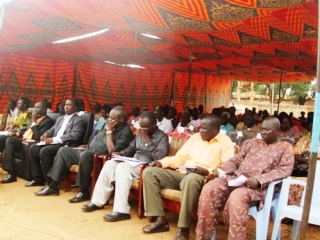W. Bahr el Ghazal state allows open debate on federalism
AUGUST 16, 2014 (WAU) – Authorities in South Sudan’s Western Bahr el Ghazal state have openly declared that citizens are free to openly debate on the controversial proposal for a federalism system of government.

“We in the government of Western Bahr el Ghazal state are very anxious to tell our people the difference between federalism and the decentralisation governing system on which our country is currently being run,” said Madut.
Different political parties attended the rally, which witnessed lectures from Boutros Mongu Nam, a political science professor at Bahr El Ghazal University.
“Federalism system is well-developed in western nations such as the United State of America, Switzerland, Germany and other countries in the world,” said Nam.
He however stressed that the current decentralisation system in South Sudan was better for a new nation to first establish its economy and improve its physical infrastructures.
“It is too early for South Sudan to over-estimate its services to the people,” said Nam.
The governor of Western Bahr el Ghazal is among the leaders opposed to a federal system of government in the world’s youngest nation, while other consider it a system to divide and rule people.
In June, South Sudanese president Salva Kiir said citizens be allowed to decide on how they wanted to be governed and stressing that federalism should not be imposed onto them. He observed that a federalism system was what southern Sudan demanded for from Sudan during the 1947 Juba conference.
The framers of South Sudan’s 2011 transitional constitution avoided mention of federalism and instead opted for a nominally decentralised system.
(ST)
